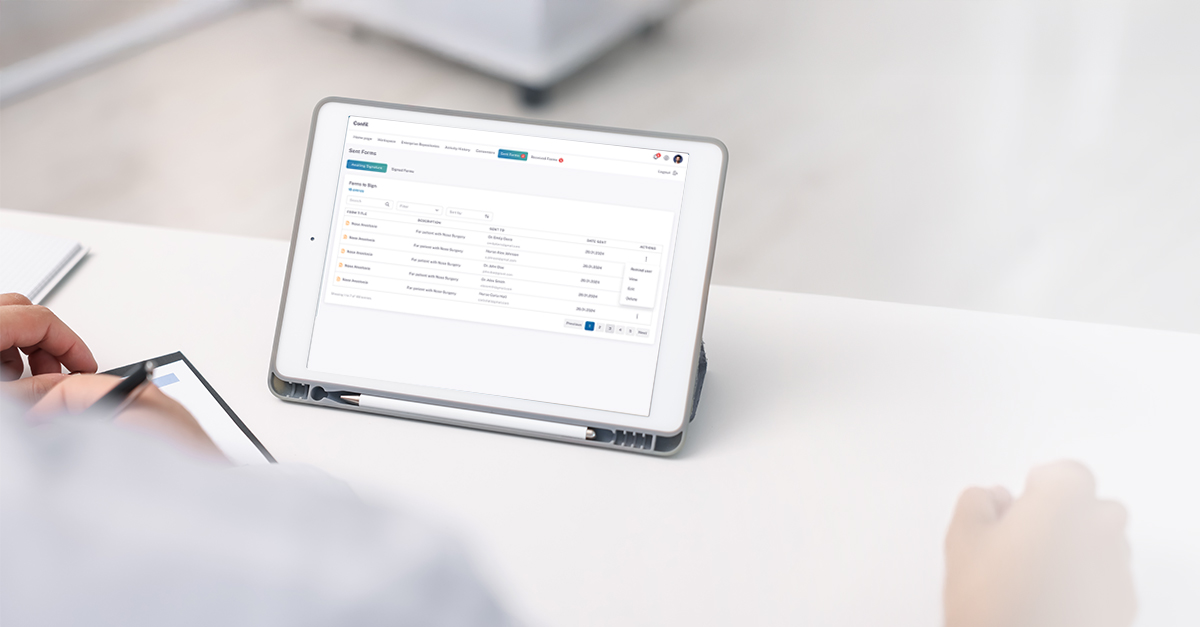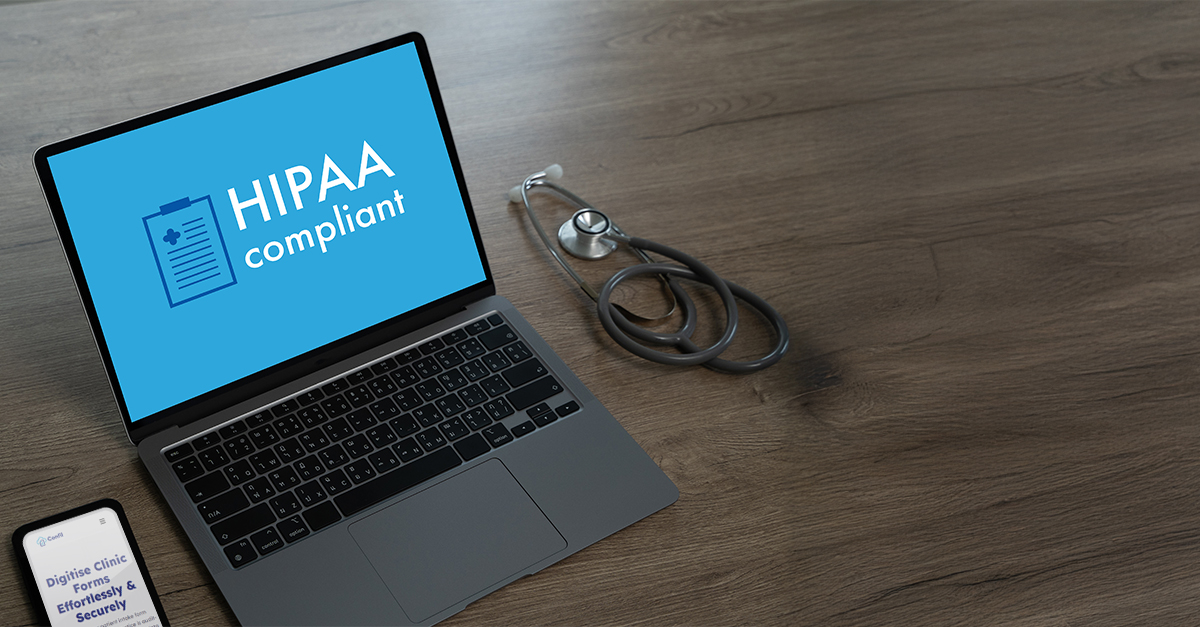5 Ways to Speed Up Patient Form Completion
Tips
29.05.2025
If your clinic still relies on paper medical history forms, it may be time to rethink your process. Paper forms can slow down patient intake, create room for errors, and require extra time for data entry and storage. In contrast, digital forms provide a faster, more accurate, and more efficient way to collect and manage patient information. They streamline workflows, reduce administrative burdens, and offer a more convenient experience for both staff and patients. In today's fast-paced healthcare environment, even small time savings can make a meaningful impact on operations. Whether you're managing a small practice or a growing clinic, the shift to digital is a smart investment. In this post, we'll explore eight powerful reasons to make the switch - and how it can benefit your team and your patients.






 Switching to digital medical history forms offers lasting benefits for both your clinic and your patients. By eliminating paperwork and streamlining the intake process, your team saves valuable time and avoids common data entry errors. Patients appreciate the convenience of completing forms at home, while your staff benefits from faster access to accurate, well-organised records. Beyond improving workflow, digital forms also enhance data security and help your practice stay compliant with privacy regulations. Over time, these advantages translate into lower operational costs and a more professional, patient-friendly experience. If you're ready to modernise your clinic's operations and reduce the stress of paperwork, now is the time to switch to digital. Visit our website to learn more or contact our team for personalised guidance on getting started.
Switching to digital medical history forms offers lasting benefits for both your clinic and your patients. By eliminating paperwork and streamlining the intake process, your team saves valuable time and avoids common data entry errors. Patients appreciate the convenience of completing forms at home, while your staff benefits from faster access to accurate, well-organised records. Beyond improving workflow, digital forms also enhance data security and help your practice stay compliant with privacy regulations. Over time, these advantages translate into lower operational costs and a more professional, patient-friendly experience. If you're ready to modernise your clinic's operations and reduce the stress of paperwork, now is the time to switch to digital. Visit our website to learn more or contact our team for personalised guidance on getting started.
1. Faster Patient Intake with Digital Medical History Forms
Switching to digital medical history forms can streamline one of the most time-consuming parts of a clinic visit - patient intake. Instead of handing out clipboards and waiting for handwritten forms to be filled, patients can complete their paperwork online before they arrive. This saves time at the front desk and helps reduce long queues in the waiting area. For staff, it eliminates the need to manually enter patient data into the system, lowering the chance of input errors. With less time spent on paperwork, your team can focus more on providing care - and patients enjoy a quicker, smoother start to their appointment.
2. Improved Accuracy Compared to Paper Forms
Paper medical history forms slow down your workflow and often lead to mistakes - whether it's missing details or hard-to-read handwriting. Switching to digital forms speeds up the intake process by guiding patients through every required field and ensuring no information is skipped. With built-in validation, digital forms help catch inconsistencies before they reach your team. That means fewer follow-up calls and less time correcting records. The result? A faster check-in experience and more accurate patient data from the start, saving time for both staff and patients.
3. Enhanced Data Security for Medical History Forms
Paper-based records are easy to misplace, damage, or access without permission - but digital medical history forms offer a much safer alternative. With secure cloud storage, encryption, and access controls, clinics can protect sensitive patient data more effectively. Digital forms also make it easier to comply with privacy regulations like HIPAA, giving your practice peace of mind and helping you avoid costly mistakes. Unlike physical files that sit in cabinets, digital records are backed up regularly and can be tracked for every access point. This added layer of security builds trust with patients who expect their information to be handled responsibly.
4. Better Patient Experience in Clinics
Digital forms aren't just easier for your staff - they're a big improvement for patients too. Instead of rushing through paperwork in a crowded waiting room, patients can fill out their medical history forms comfortably at home. This gives them time to review their information carefully, leading to more accurate details and a less stressful check-in process. Plus, shorter wait times and fewer follow-up questions make the overall visit feel smoother and more efficient. When patients feel their time is respected, it boosts satisfaction and increases the chance they'll return to your clinic.
5. Easier Access and Storage of Medical History Forms
Storing paper files takes up physical space and makes finding specific information time-consuming. With digital medical history forms, everything is organised and easy to retrieve in just a few clicks. Whether you're reviewing a patient's past visit or preparing for a follow-up, having quick access to accurate records saves valuable time. Digital storage also reduces the risk of lost or misfiled documents and makes it easier to share records securely when needed. For busy clinics, this means smoother operations and better continuity of care with less administrative stress.
6. Cost Savings Over Time
While switching to digital systems may seem like an upfront investment, it quickly pays off. Paper medical history forms come with hidden costs - printing, scanning, storing, and shredding all add up over time. Digital forms eliminate those expenses and reduce the workload on your administrative team. With fewer resources spent on handling paperwork, your staff can focus on patient care and other high-value tasks. Over time, this leads to more efficient operations, lower overhead, and better use of your clinic's budget.
7. Easier Compliance with Healthcare Regulations
Staying compliant with healthcare regulations is a constant challenge, especially when managing sensitive patient information. Digital medical history forms make compliance easier by automatically storing data in secure, encrypted formats that align with standards like HIPAA. They can also include time-stamped records, electronic signatures, and audit trails, which are essential for maintaining proper documentation. With digital tools, your clinic can reduce the risk of non-compliance penalties and demonstrate a higher level of professionalism and accountability. It's a proactive way to protect your practice while maintaining trust with patients.
8. Scalability for Growing Clinics
As your clinic expands, managing increasing volumes of patient data can quickly become overwhelming. Digital medical history forms make it easier to scale without adding administrative strain. Whether you're opening a new location or simply seeing more patients, digital systems can handle the growth seamlessly - no extra filing cabinets, storage rooms, or manual entry needed. With the right digital setup, onboarding new staff, syncing data across departments, and maintaining consistency becomes far more manageable. It's a future-proof solution that grows with your practice, not against it. Switching to digital medical history forms offers lasting benefits for both your clinic and your patients. By eliminating paperwork and streamlining the intake process, your team saves valuable time and avoids common data entry errors. Patients appreciate the convenience of completing forms at home, while your staff benefits from faster access to accurate, well-organised records. Beyond improving workflow, digital forms also enhance data security and help your practice stay compliant with privacy regulations. Over time, these advantages translate into lower operational costs and a more professional, patient-friendly experience. If you're ready to modernise your clinic's operations and reduce the stress of paperwork, now is the time to switch to digital. Visit our website to learn more or contact our team for personalised guidance on getting started.
Switching to digital medical history forms offers lasting benefits for both your clinic and your patients. By eliminating paperwork and streamlining the intake process, your team saves valuable time and avoids common data entry errors. Patients appreciate the convenience of completing forms at home, while your staff benefits from faster access to accurate, well-organised records. Beyond improving workflow, digital forms also enhance data security and help your practice stay compliant with privacy regulations. Over time, these advantages translate into lower operational costs and a more professional, patient-friendly experience. If you're ready to modernise your clinic's operations and reduce the stress of paperwork, now is the time to switch to digital. Visit our website to learn more or contact our team for personalised guidance on getting started. 